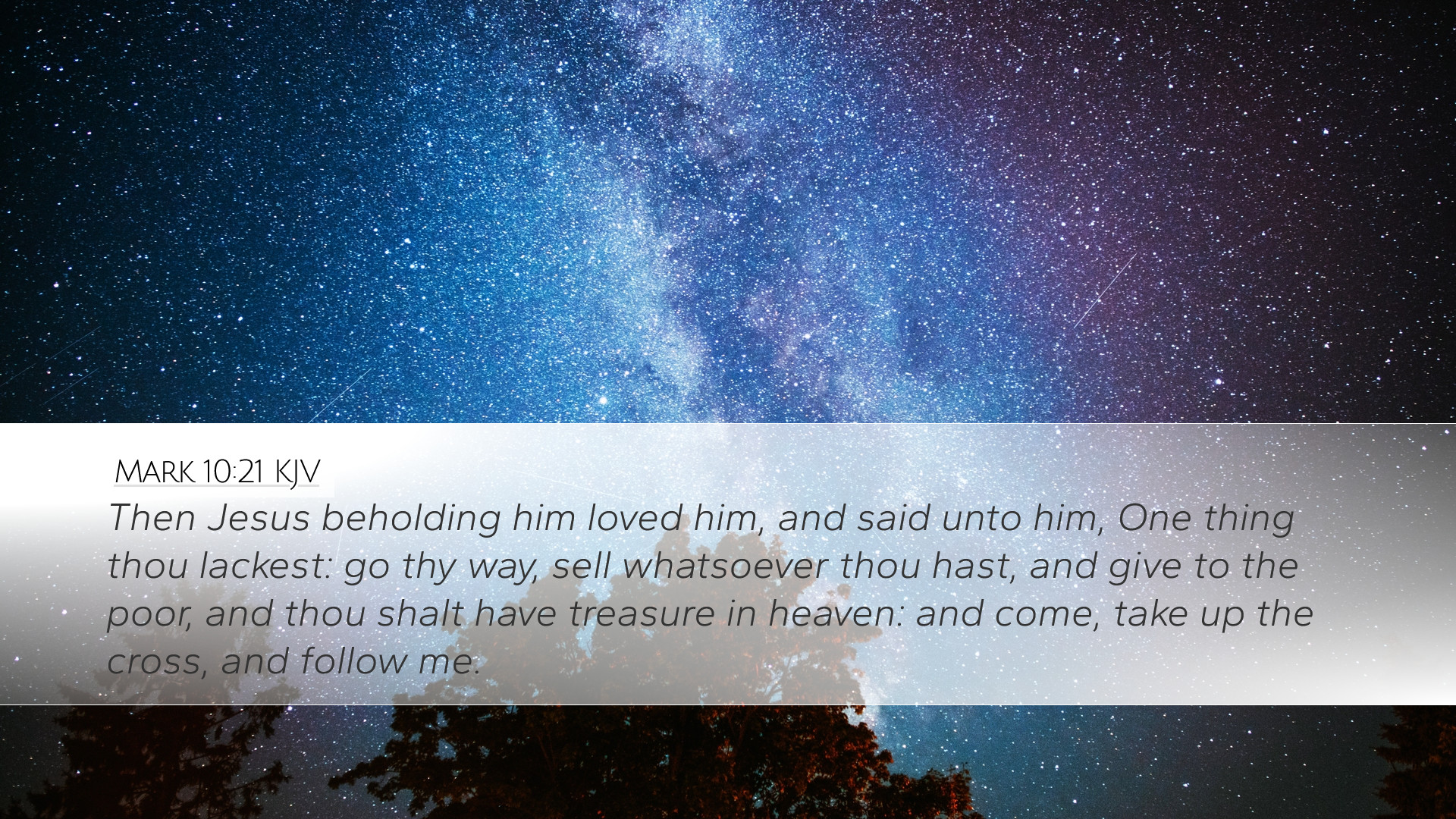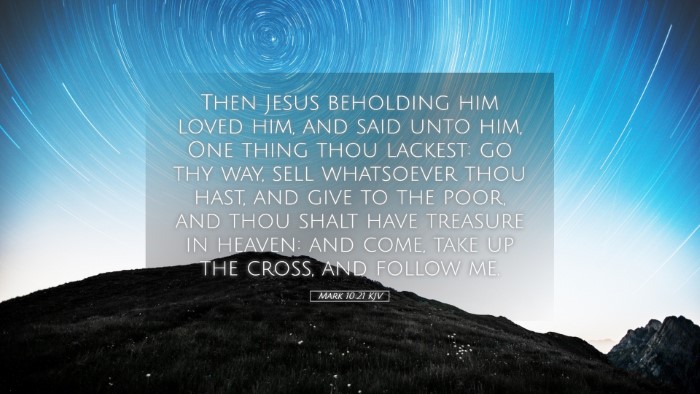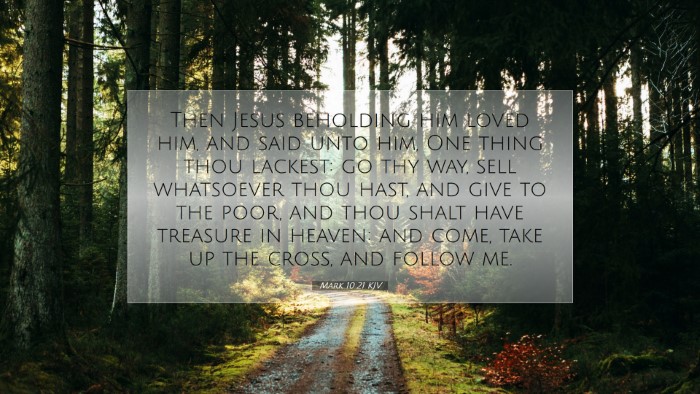Commentary on Mark 10:21
Mark 10:21 states, "Then Jesus, looking at him, loved him, and said to him, ‘One thing you lack: go your way, sell whatever you have and give to the poor, and you will have treasure in heaven; and come, take up the cross, and follow Me.’"
Introduction
This verse provides a profound insight into the nature of discipleship and the sacrifice it entails. It captures a moment of deep personal interaction between Jesus and a young ruler who seeks eternal life. The verse invites theological reflection on wealth, commitment, and the nature of true followership of Jesus.
Exegesis of the Verse
In analyzing Mark 10:21, we see Jesus engaging the rich young ruler with both love and challenge. Let's explore this interaction through insights drawn from public domain commentaries.
The Gaze of Jesus
Matthew Henry emphasizes that Jesus "looking at him" signifies a profound understanding and acknowledgment of the young man's heart. This gaze is filled with compassion, revealing Christ’s heartfelt concern for the man's spiritual state.
The Love of Christ
Albert Barnes notes that Jesus' love for the young ruler was genuine. It highlights the nature of Jesus’ ministry; He approaches individuals in their search for meaning and fulfillment, even when their lives are entangled with material possessions.
The Call to Sacrifice
The phrase “One thing you lack” is pivotal. Adam Clarke points out that this statement reflects the essential requirement of true discipleship: moving beyond mere adherence to the commandments and engaging in radical generosity. Jesus challenges the young man to divest himself of his wealth, which is preventing him from fully following Christ.
The Issue of Wealth
This discourse fundamentally addresses the relationship between wealth and spiritual life. Each commentary offers profound reflections on the implications of wealth in the life of a follower of Christ.
Wealth as a Hindrance
Matthew Henry comments that wealth can often prove a hindrance rather than a help in seeking a relationship with God. The rich young ruler’s dilemma is emblematic of how earthly treasures can preclude spiritual endeavors.
The Call to Redistribute Resources
Barnes elaborates on Jesus’ command to sell all he has and give to the poor, noting that this act symbolizes a detachment from materialism and a reallocation toward altruism. This is not merely about giving; it’s about aligning one’s heart with God’s priorities.
The Promise of Treasure in Heaven
Jesus’ directive includes a promise of “treasure in heaven.” This heavenly treasure is a central theme in biblical understanding and the commentaries provide rich insights into its implications.
Eternal Perspective
Henry reflects that Jesus encourages the young ruler to look beyond the temporary nature of earthly riches to the everlasting rewards of following Him. The eternal perspective provides motivation for sacrifices made in this life for the sake of the Kingdom.
Heavenly Rewards
Clarke also notes that the term "treasure in heaven” signifies spiritual rewards rather than temporal possessions. This aligns with the central message of the gospel: true fulfillment comes not from earthly acquisition but from being part of God's eternal plan.
Discipleship: The Call to Follow
Jesus concludes His exhortation with a call to “take up the cross, and follow Me.” This is a powerful statement encapsulating the essence of Christian discipleship.
The Cross as a Symbol of Commitment
Barnes highlights that the cross symbolizes a call to bear trials, sacrifices, and the burdens of following Christ. It signifies the rejection of worldly values and an embrace of self-denial for the sake of the Gospel.
Following Christ: A Lifelong Journey
Henry clarifies that following Christ involves a transformative commitment, not a one-time decision. It necessitates ongoing submission to Christ’s lordship and aligning one’s priorities with His mission.
Theological Implications
This verse opens up various pathways for theological reflection on the nature of salvation, grace, and the radical demands of following Jesus.
Salvation and Wealth
Commentators agree that Jesus’ encounter with the rich young ruler underscores a core theological premise: salvation cannot be earned through moral excellence or adherence to the law alone. Instead, it requires complete surrender to Christ. This challenges both rich and poor alike to examine their reliance on earthly security.
Grace and Human Responsibility
Clarke argues that while grace is the foundation of salvation, human responsibility in responding to that grace is paramount. The rich young ruler's discontent signals the tension between divine invitation and human disposition toward sin and materialism.
Practical Applications
For pastors, students, and theologians, the lessons from Mark 10:21 are especially pertinent in contemporary discipleship discussions.
Assessing Our Attachments
Henry’s reflections compel believers to assess their attachments to material possessions. Are our hearts genuinely pursuing the Kingdom of God, or are we subtly ensnared by wealth?
Encouragement Toward Generosity
Barnes advocates for a lifestyle of generosity rooted in sacrificial giving. This is not simply about financial contribution but also encompasses our time, talents, and resources devoted to God’s work.
Living with Eternal Intentions
Finally, Clarke emphasizes living with eternity in view. The call to follow Christ with the understanding that our earthly actions have eternal consequences should motivate deeper devotion and holistic discipleship.
Conclusion
Mark 10:21 challenges believers to consider the cost of discipleship in light of eternal significance. Through a lens of love, Christ invites His followers into a radical, transformative experience of surrender. The rich young ruler’s encounter serves as both a warning and an invitation—a clarion call to prioritize the Kingdom over material wealth.
As we reflect on this profound passage, may we be inspired to deepen our commitment to Christ, lead a life marked by generosity, and pursue the treasure that comes from following Him faithfully.


